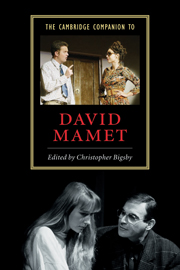Book contents
1 - David Mamet
Published online by Cambridge University Press: 28 May 2006
Summary
In 1974, a play set in part in a singles bar, laced with obscene language and charged with a seemingly frenetic energy, was voted Best Chicago Play. Transferred to Off Off and Off Broadway it picked up an Obie Award. Sexual Perversity in Chicago was not David Mamet's first play, but it did mark the beginning of a career that would astonish in both its range and depth.
The following year American Buffalo opened at Chicago's Goodman Theatre in an “alternative season.” It was well received and opened on Broadway fifteen months later where it won the New York Drama Critics Circle Award. It ran for 135 performances, hardly a failure but in the hit or miss world of New York, not a copper-bottomed success either. Nonetheless, in three years he had announced his arrival in unequivocal terms.
David Mamet came as something of a shock, not least because his first public success, Sexual Perversity in Chicago, seemed brutally direct in terms of its language and subject, as did American Buffalo. But it was already clear to many that here was a distinctive talent, albeit one that some critics found difficult to assess, not least because of his characters’ scatological language and fractured syntax, along with the apparent absence, in his plays, of a conventional plot. They praised what they took to be his linguistic naturalism, as though his intent had been to offer an insight into the cultural lower depths while capturing the precise rhythms of contemporary speech (though he did invoke Gorky’s The Lower Depths as being, like a number of his own plays, a study in stasis). That he was highly talented seemed obvious, but what that talent might consist of was altogether less certain.
- Type
- Chapter
- Information
- The Cambridge Companion to David Mamet , pp. 1 - 40Publisher: Cambridge University PressPrint publication year: 2004
- 15
- Cited by

